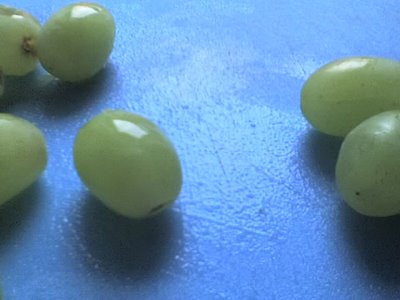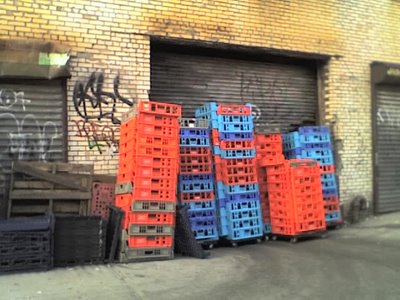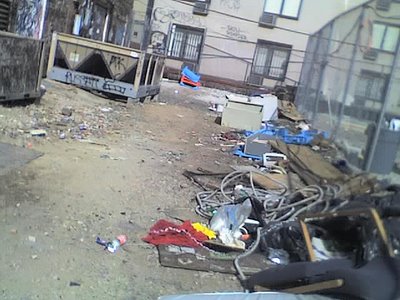Wednesday, October 18, 2006
Natural Affinity?
Posted by
varsity aesthete
at
12:22 AM
1 comments
![]()
![]()
Labels: blue-green, human biology
Tuesday, October 17, 2006
Aesthete Guilt at the Movies

Two-thirds of the way through Open Water, I noticed the gorgeous Caribbean seascapes where the couple is dealing with their life and death decisions and desperation. As the skies became saturated in pinks and reds and the striking silhouettes of the clouds sharpened, beauty was again put in its place. Not once mentioned - aesthetically powerful yet irrelevant in light of the present human drama.
Posted by
varsity aesthete
at
3:34 PM
0
comments
![]()
![]()
Labels: aesthete guilt, clouds, insignificance, movies, sky, water
Monday, October 16, 2006
Glossary

aesthete: one having or affecting sensitivity to the beautiful especially in art
aesthetic: a particular theory or conception of beauty or art --
a particular taste for or approach to what is pleasing to the senses and especially sight
aesthetics: a branch of philosophy dealing with the nature of beauty, art, and taste and with the creation and appreciation of beauty--a pleasing appearance or effect
beauty: the quality or aggregate of qualities in a person or thing that gives pleasure to the senses or pleasurably exalts the mind or spirit--a particularly graceful, ornamental, or excellent quality
photo by Cody Pomeroy via flickr
Posted by
varsity aesthete
at
1:24 AM
0
comments
![]()
![]()
Labels: reference
Sunday, October 15, 2006
Yapha
It was one of those sparkly days. I'd just been fired and was so delighted to be free and undetermined. This shot was irresistable: the glowing debris so pefectly decorative in the gray-brown field--the yes-no so textbook. Who can gamble on laser eye surgery when vision is so delicious?
photo by Varsity Aesthete MAR06
Posted by
varsity aesthete
at
11:39 PM
0
comments
![]()
![]()
Saturday, October 14, 2006
Betty Borges
Posted by
varsity aesthete
at
3:21 AM
0
comments
![]()
![]()
Labels: props
Friday, October 13, 2006
Orhan Pamuk on Beauty and Decay

Pamuk was awarded the Nobel Prize in Literature on Thursday, and today The New York Times published this excerpt from his memoir Istanbul: Memories and the City translated from the Turkish by Maureen Freely. Quickly reading through the paper on my way to work this morning the passage shook me pointing to a segregation I hadn't seen before and an arrogance I hadn't fully acknowledged.
To savor Istanbul’s back streets, to appreciate the vines and trees that endow its ruins with accidental grace, you must, first and foremost, be a stranger to them. A crumbling wall, a wooden tekke — condemned, abandoned, and now fallen into neglect — a fountain from whose faucets no water pours, a workshop in which nothing has been produced for eighty years, a collapsing building, a row of homes abandoned by Greeks, Armenians, and Jews as a nationalist state bore down on minorities, a house leaning to one side in a way that defies perspective, two houses leaning against each other in the way that cartoonists so love to depict, a cascade of domes and rooftops, a row of houses with crooked window casings — these things don’t look beautiful to the people who live among them; they speak instead of squalor, helpless hopeless neglect. Those who take pleasure in the accidental beauty of poverty and historical decay, those of us who see the picturesque in ruins — invariably, we’re people who come from the outside.
Often I feel pleased and proud blissing out on broken this, or fraying that as I go about my life. Thank goodness for me, you know, rootin' for the underdog. However, even I am occasionally put off by my unexamined pleasure at some of life's difficulties. Usually though, it's all private and in my head and I mostly ignore the complication and chalk up another point for myself on the aesthete scoreboard. There was one time though, that my indiscriminate bliss hurt my Mom's feelings and exposed a callousness that made me embarrassed.
Back in high school, when I was still going to church with Mom every week and considered polish and sheen a kind of disingenuous showing off, preferring instead the authenticity of wear and tear, I considered making a series of photographs showing the decaying beauty of the city. Mentioning this to Mom one Sunday, I recall she supported the idea at first, but that as I pointed in illustration to the paint falling cracked and rotten off the walls high above the congregation, she winced admonishing me, "Oh no. Don't photograph that." She felt the building's dignity eroding with its physical changes and saw my photographing that as an exploitative exposure of these sad circumstances. As photographers we shared a vision, but our sympathies and allegiances were very different.
While the deterioration endeared the old building to me, in the years since, I've found that the polished and grand and perfect are indeed beautiful to me now as well. At that time though, perhaps due to my youth and perceived smallness, the imperfections of grand things cut them down to size. It's hard to say for sure, of course, because that sort of reflective introspection is so imprecise, but recalling that exchange even now, a part of me winces at the arrogance of not even considering another perspective.
For Mom it was a sign of the poor condition of our parish at the time, but I, removed from concern by youth, asked only for the church to please me. Mom felt instead the more adult pangs of responsibility and obligation.
What makes the passage from Istanbul especially valuable though is Pamuk's concession in the end. With "us" and "we're", this author, so often preoccupied by the complications of identity and allegiance, lowers his pointed finger and joins us in the detached romance of good fortune.
Photo Credit Nicole Bengiveno NYT
Posted by
varsity aesthete
at
11:07 PM
2
comments
![]()
![]()
Labels: aesthete guilt, decay, pamuk, varsity aesthete




